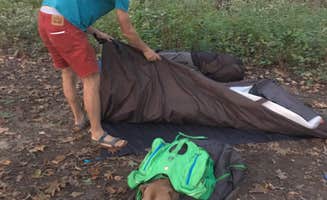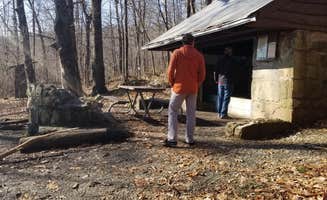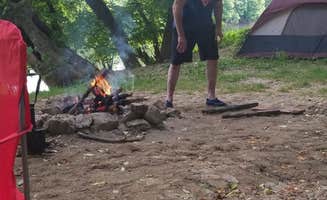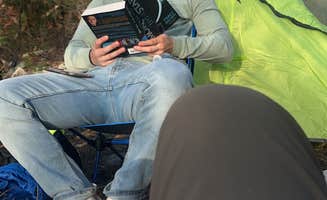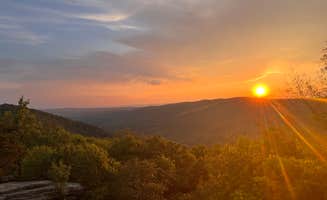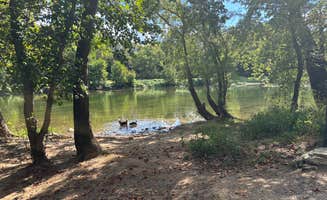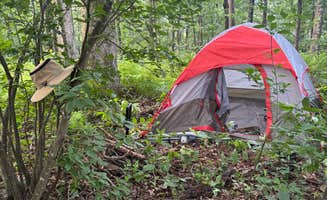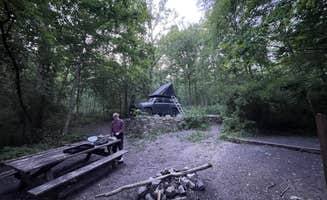Primitive camping near Casanova, Virginia occurs primarily on public lands at elevations ranging from 700 to 3,500 feet, with seasonal temperature variations affecting site availability. The region experiences heavy spring runoff that impacts creek crossings from March through May, with summer humidity making bug protection essential at lower elevation sites. Many campsites require advance preparation as drinking water sources are limited throughout George Washington National Forest and Shenandoah National Park.
What to do
Riverside activities: At South Fork Shenandoah River, access to water recreation defines the experience. "The site was wonderful! Not too many spaces so it can fill up quick. There is a launch in the middle, so there is a bit of come and go," notes camper Heather. Water levels fluctuate seasonally, with sites sometimes becoming unusable after heavy rain.
Day hiking from camp: Short trails from Little Fort Campground provide easy exploration options. "Nice flat camp site with picnic table and fire pit... Long and winding road to get there with no service so be cautious," reports Zack B. The area includes several small forest trails accessible directly from campsites.
Wildlife observation: Animal sightings are common throughout the region's dispersed sites. At Laurel Prong Trail, campers should prepare for encounters as one visitor observed: "Bears were constantly checking out our tent during night... after one bear sniffed that sucker out 15 minutes later while we were in our tent we heard the first one full sprint and slobbering to check it out."
What campers like
Ridge-top views: The elevation gain required to reach Veach Gap - GWNF - Backpacking Site rewards hikers with exceptional vistas. "Very much worth the 4 mile hike up to the site. 1,200ft elevation difference from the trailhead to the site. Cell service at the top (not during the hike or on the road to the trailhead so prepare directions)," shares TJ W.
Secluded campsites: Many primitive camping options near Casanova offer isolation. "There are 9 campsites, each with at least one fire ring, a tent pad and a picnic table, and there is a vault toilet in the middle. I arrive at 7:30pm on a Saturday in late August and thought I might be too late to get a spot but there were only two other groups there," reports Lindsay C. about Little Fort.
Off-season opportunities: Fall and spring camping provides unique experiences with fewer crowds. "Went up in November with beautiful weather, fall leaves changing and great company. Couldn't have had a better experience," notes a Veach Gap visitor. Spring brings wildflowers but requires additional layers as temperatures can vary significantly.
What you should know
Permit requirements: Shenandoah National Park Dispersed Sites require backcountry permits for overnight stays. "There are so many trails to hike throughout the park and with a backcountry permit, you can find countless campsites," explains Matt P. The $30 park entrance fee is separate from camping permits.
Water planning: Seasonal water availability affects trip planning. According to a Veach Gap visitor: "Pack up all the water you will need for the day/evening/morning. Once you get to the top there are several sites with little fire rings, and since it is on the ridgeline, the views are breathtaking."
Site registration systems: Some dispersed camping areas use self-registration methods. At Little Fort Campground, "You select a campsite by flipping a washer on a hook on the board from green to red. Flip it back when you leave," explains one camper. Not all visitors follow these systems, potentially causing confusion about site availability.
Tips for camping with families
Accessibility considerations: When backcountry camping with children, consider the difficulty of hikes. One camper at Laurel Prong Trail Dispersed shared: "This campsite is another one we found on a list provided by Shenandoah's park rangers and was listed as moderate hike and easy camping... the easy camping might be a slight exaggeration."
Wildlife precautions: Teach children proper food storage protocols. Allan M. warns about Laurel Prong: "100% do not have food scents near your tent." Bear encounters are common throughout the region, making proper food storage essential for family safety.
Noise factors: Some primitive sites experience unexpected noise. At South Fork Shenandoah, a visitor cautions: "Dont disregard the warnings about noise like i did, constant speakers all the time until 4am." Similarly, Little Fort campers mention: "It is next to an off-road vehicle trail and there was a lot of action coming down until about 7 PM."
Tips from RVers
Road conditions: Access to Crisman Hollow Road Camp can be challenging for larger vehicles. "Some roads were closed. Some spots were full of trash," notes Waseem H. Seasonal road closures affect accessibility, particularly after heavy rains or winter weather.
RV limitations: Most dispersed camping near Casanova has significant RV restrictions. The South Fork Shenandoah River area accommodates smaller RVs, with one camper noting: "The site at the end of the road is beautiful. We stayed right at the end of the road, since we have a 30 foot RV, but there are sites you can walk to all the way down the river."
Self-contained requirements: No hookups exist at any dispersed sites, requiring RVers to be fully self-contained. Vault toilets at Little Fort Campground often lack supplies, as one visitor mentions: "Bathrooms had no TP so bring your own, and please remember to pack out your trash!"


